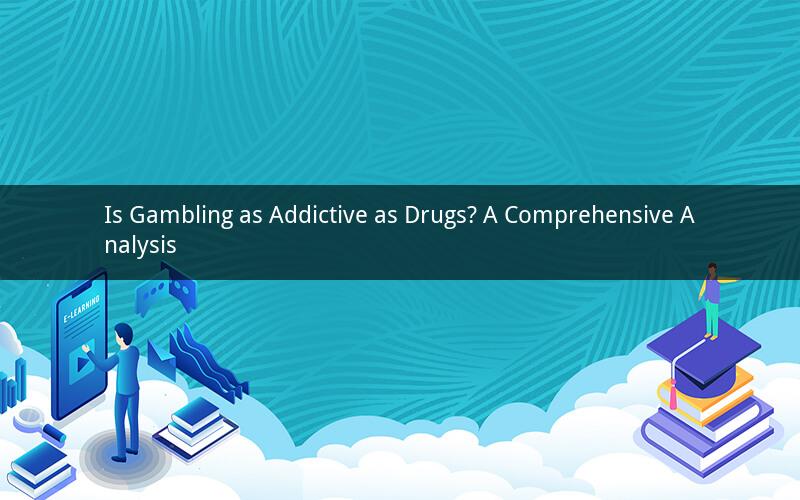
Introduction:
Gambling has been a popular form of entertainment for centuries, but its addictive nature has sparked debates among experts. Some argue that gambling is as addictive as drugs, while others believe it is a mere form of entertainment. This article aims to explore the similarities and differences between gambling and drug addiction, providing a comprehensive analysis of the topic.
I. Understanding Gambling Addiction
1. What is gambling addiction?
Gambling addiction, also known as problem gambling or compulsive gambling, is a behavioral addiction characterized by an inability to control or stop gambling despite negative consequences. It is a chronic condition that affects individuals of all ages, genders, and socioeconomic backgrounds.
2. Signs and symptoms of gambling addiction
a. Preoccupation with gambling: Constant thoughts about gambling, planning for future gambling sessions, and reliving past gambling experiences.
b. Loss of control: Inability to stop gambling, even when facing financial, social, or personal problems.
c. Lying and deceit: Hiding gambling activities from family, friends, or employers.
d. Chasing losses: Trying to recover lost money by gambling more, often leading to even greater losses.
e. Risky behavior: Taking excessive risks in gambling activities, including borrowing money, selling personal belongings, or neglecting responsibilities.
II. Understanding Drug Addiction
1. What is drug addiction?
Drug addiction, also known as substance use disorder, is a chronic disease characterized by the compulsive use of a substance despite harmful consequences. It involves the brain's reward system, leading to intense cravings and a loss of control over drug use.
2. Signs and symptoms of drug addiction
a. Tolerance: Needing higher doses of the substance to achieve the desired effect.
b. Withdrawal symptoms: Experiencing physical and psychological symptoms when the substance is stopped or reduced.
c. Loss of control: Inability to stop using the substance, even when facing negative consequences.
d. Neglecting responsibilities: Failing to fulfill work, school, or family obligations due to drug use.
e. Continued use despite consequences: Continuing to use the substance despite knowing the harmful effects.
III. Similarities between Gambling and Drug Addiction
1. Reward system
Both gambling and drug addiction involve the brain's reward system. When individuals engage in these activities, the brain releases dopamine, a neurotransmitter associated with pleasure and reward. This dopamine release creates a sense of euphoria and reinforces the behavior, leading to compulsive engagement.
2. Loss of control
Both gambling and drug addiction often result in a loss of control over the behavior. Individuals may find themselves unable to stop gambling or using drugs, even when facing negative consequences. This loss of control is a hallmark of addiction and can lead to severe problems in various aspects of life.
3. Continued use despite consequences
Both gambling and drug addiction involve continued use of the substance or activity despite knowing the harmful effects. Individuals may experience financial, social, and personal consequences, yet they continue to engage in these behaviors due to the reinforcing effects of the reward system.
IV. Differences between Gambling and Drug Addiction
1. Physical dependence
While drug addiction often leads to physical dependence, gambling addiction does not. Physical dependence involves the body's adaptation to the substance, leading to withdrawal symptoms when the substance is stopped. In contrast, gambling addiction primarily affects the individual's behavior and mental health.
2. Legal and social consequences
Drug addiction often carries severe legal and social consequences, including criminal charges, imprisonment, and social stigma. While gambling addiction can also lead to legal and social problems, they are generally less severe compared to drug addiction.
3. Treatment approaches
The treatment approaches for gambling and drug addiction differ. Treatment for drug addiction often involves medication, counseling, and support groups. In contrast, treatment for gambling addiction primarily focuses on counseling, cognitive-behavioral therapy, and support groups.
V. Conclusion
In conclusion, while gambling and drug addiction share some similarities, such as the reward system and loss of control, they also have distinct differences. While drug addiction often leads to physical dependence and severe legal and social consequences, gambling addiction primarily affects the individual's behavior and mental health. Understanding these similarities and differences is crucial in developing effective prevention and treatment strategies for both gambling and drug addiction.
Questions and Answers:
1. Q: Can gambling addiction be treated?
A: Yes, gambling addiction can be treated. Treatment approaches include counseling, cognitive-behavioral therapy, and support groups. With proper treatment and support, individuals with gambling addiction can recover and lead fulfilling lives.
2. Q: Is gambling addiction more common in certain demographics?
A: Yes, gambling addiction is more common in certain demographics, such as individuals with a family history of addiction, those with mental health disorders, and individuals with a history of trauma. However, it can affect anyone, regardless of age, gender, or socioeconomic background.
3. Q: Can gambling addiction lead to physical health problems?
A: While gambling addiction itself does not cause physical health problems, it can lead to indirect physical health issues. For example, individuals with gambling addiction may neglect their health due to financial strain or stress, leading to problems such as poor nutrition, lack of exercise, and sleep deprivation.
4. Q: Are there any medications available to treat gambling addiction?
A: Currently, there are no medications specifically designed to treat gambling addiction. However, some medications may be used to address co-occurring mental health disorders, such as depression or anxiety, which can contribute to gambling addiction.
5. Q: Can gambling addiction be prevented?
A: Yes, gambling addiction can be prevented by promoting responsible gambling practices, raising awareness about the risks of gambling, and providing education on the signs and symptoms of addiction. Implementing stricter regulations on gambling and promoting healthy coping mechanisms can also help prevent gambling addiction.